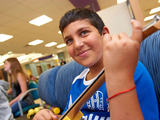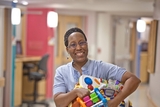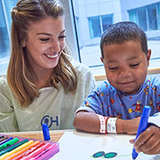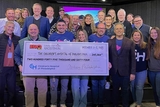Child Life, Education and Creative Arts Therapy

The Child Life, Education and Creative Arts Therapy Department at Children’s Hospital of Philadelphia (CHOP) supports the unique needs of children as they cope with illness, injury, treatment, hospitalization and the overall healthcare experience. Our specialized team partners with you and your child’s care team to minimize the stress of a hospital or outpatient visit while meeting healthcare goals.
We’ll work closely with your family to:
- Promote positive coping and self-expression related to healthcare through therapeutic play
- Reduce fear, stress and pain by providing opportunities to become familiar with the healthcare environment
- Develop supportive relationships with children and caregivers through creative art therapies and play
- Provide developmentally appropriate education about medical procedures and diagnoses
- Bridge the gap between home and hospital with familiar activities

Family resources
This list of resources can help you prepare and support your child (and their siblings) during a doctor’s visit or even hospitalization.

Professional education opportunities
The Child Life, Education and Creative Arts Therapy Department at CHOP is always looking for top talent to add to our team. We offer formal and accredited internships, fellowships and practicum experiences in child life, art therapy, music therapy, dance movement therapy and patient media programs production.

Patient stories
Every day, we work to positively impact children and families in our care.
News

BIG 98.1 Loves Our Kids Radiothon Raises More Than $245,000 for CHOP Child Life
CHOP, in partnership with Audacy Philadelphia, raised more than $245,000 for our Child Life, Education and Creative Arts Therapy Department at the 22nd annual BIG 98.1 Loves Our Kids Radiothon.

CHOP Adds Second Facility Dog, Nettle
Nettle, a 2-year-old yellow Labrador Retriever, has joined CHOP as the organization’s second facility dog.
Throughout the year, our team distributes toys and activities to bring joy and comfort to children in the hospital. We are always in need of donations. You can help bring a smile to a sick child’s face. Here’s how.
